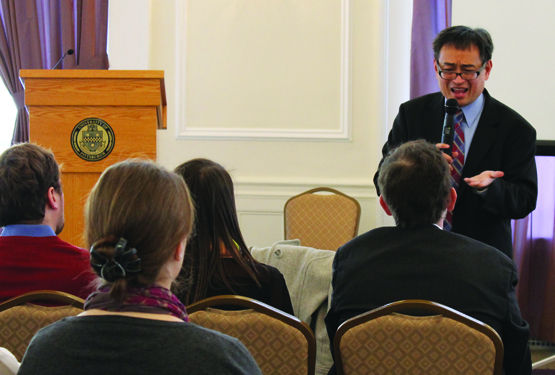International students share culture-shock stories

January 23, 2014
When Pitt police pulled over Halid Mardini for running a red light on his way to class, they asked him if he was insane.
“No,” Mardini said. He was late for class and really needed to cross. Mardini told the officer he thought it was ok to go through the light if he was in a hurry.
Mardini, a junior from Turkey majoring in psychology and economics, said the biggest adjustment he made when he came to the United States was learning that he had to obey the law.
“They don’t really do that in Istanbul,” Mardini said.
Mardini and six other international students spoke to roughly 100 people about their stories of culture shock and readjustment at the Social Justice Symposium hosted by Pitt’s Office of Student Affairs at 9 a.m. on Thursday in the University Club.
Oyeronke Oyebode, a junior from Nigeria majoring in health sciences, said she told everyone to call her “Ronnie” when she first came to Pitt because its pronunciation was easier than that of her real name. But years later, she realized it was an “insult to her culture” to let people call her by an Americanized name.
“Your parents name you for a specific reason,” Oyebode said. “If you were born on a Sunday, they might name you Sunday. My name is Oyeronke. You’re just kind of expected to take on the American culture.”
Professor Rudie Altamirano, the keynote speaker and director of International Student and Scholar Services at the University of Pennsylvania, said he experienced many instances of culture shock when he came to the United States from the Philippines more than 30 years ago.
Altamirano recounted a story of an acquaintance who offered him a ride to the airport as he walked in the cold years ago. He declined the offer, waiting for the acquaintance to offer again, as is customary in the Philippines. The driver didn’t and drove away.
At the University of Pennsylvania, Altamirano’s goal is to offer “holistic attention and multicultural empathy” for international students.
Pitt’s Office of Cross-Cultural and Leadership Development is trying to implement some of Altamirano’s suggestions in programs such as Global Ties, through which international undergraduates can meet to ease the transition of moving to a foreign country.
Gita Maharaja, an academic advisor at Duquesne University, spoke about her experiences advising undergraduate international students and the challenges she dealt with when she came to the United States.
“The concept of an appointment takes a long time to come [to international students],” Maharaja said. “How are you going to say, ‘You don’t have an appointment, please walk out of my office?’”
Many international students at Duquesne hail from Middle Eastern or Asian nations, where it is customary to give gifts as a way of saying thank you for kindness, Maharaja said. But the gesture can create problems for American professors. She advises that students not be offended if someone doesn’t accept their gifts, because American culture attaches different connotations with gift-giving.
“Of course, I accept all gifts,” she said. “My office is full of gifts.”
Maharaja teaches a seven-week course at Duquesne that gives international students a space to ask for help adjusting to American culture or address problems they’ve had with campus life so far. Though nearly all her international students can speak English to some degree, language barriers still persist between students and professors.
“All you need is one student to raise it, and everybody will agree,” she said, referring to students’ worries that their professors cannot understand them.
Duquesne also holds “conversation hours” between U.S. students and international students every Friday afternoon, Maharaja said. During these encounters, U.S. students can ask questions about different countries, and the international students can share stories about their native cultures.
The symposium closed with the panel of seven Pitt international students answering questions from the audience.
Weiqi Li, a senior from China, said if he could relive his time at Pitt, he’d try a little harder to make friends earlier on. Li said his academic experience at Pitt was much different than in China.
“In China, you’re not supposed to question the professor, because he’s the authority in the classroom,” Li said. “But here it’s completely different.”
Some of Pitt’s architecture also influenced his choice to enroll at the University.
“I chose Pitt because the Cathedral looks exactly like Hogwarts,” Li said. “I feel like my Pitt experience has been like a TV show. Here I am at my season finale ready to move on to season two.”


